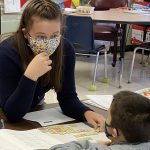At just 4 years old, Violet Jiménez Sims ’02 (SFA), ’05 MA, ’11 6th Year told her mother she wanted to “be one of the little people that lived inside the television.” Today, she laughs and says she’s learned that no one lives inside a TV, and instead of being an actress, she spends most of her time in front of a different audience: college students.
“Good teachers have to be good actors,” Sims says. “You have to be entertaining enough to capture students’ attention and use improv skills sometimes when things don’t go right.”
The data represents the lowest scores in 4th-grade reading since 1998 and the lowest in 8th-grade math since 2000 in the state of Connecticut.
Eric Loken, a professor at UConn’s Neag School of Education who is affiliated with the Measurement, Evaluation and Assessment program, said he considered the results to be “pretty strong evidence” of a drop in student scores. “It’s good data, and the change in it is quite dramatic,” said Loken. “This is really a data source that people tend to rely on and take as a good indicator to track performance over time.”
Elizabeth “Liz” DeVitto ’14 (ED), ’15 MA, a special education teacher for the past eight years at Roaring Brook Elementary School in Avon, Connecticut, had a goal to write a children’s book before she turned 30. When she looked for a book to help her students deal with emotions, she couldn’t find anything appropriate. Since she couldn’t find the right book, she decided this was her chance to fulfill her goal by publishing a book, Finding a Safe Spot, to help her students when they become overwhelmed with emotion.
Patricia “Pat” Jepson’s history with UConn spans several decades – from her time as a high school student to her retirement in 2017. Throughout her career, Jepson worked to promote excellence and diversity in Connecticut’s agricultural education programs – a commitment she maintains even now. As a student at Wilson High School (now Middletown High School), Jepson was involved in her school’s agriculture program and took UConn co-op credits. Jepson, a first-generation college student, went on to study animal science at UConn.
Name: Derek Flynn Position: Science teacher (chemistry and physics) at Masuk High School Coming from: Naugatuck High School, where he taught for three years. Grew up in: Monroe, graduated in Masuk’s Class of 2008 Education: Earned a Bachelor’s degree in pre-vet animal science and a Master’s degree in curriculum and instruction from the University of Connecticut
“During my senior year of high school, I signed up to visit UConn as a Husky-for-a-Day. I got to shadow two current students and follow their school day. When I was on campus, I instantly knew this was the school for me! I loved the welcoming atmosphere, the friendly people, and the beautiful campus. After that day, I had no doubts in my mind: I was going to UConn,” says graduating senior Julianna Carney ’22 (ED).
“School assignments that a student is expected to do outside of the regular school day—that’s homework,” says Sandra Chafouleas, a UConn Board of Trustees Distinguished Professor at the Neag School of Education. “The general guideline is 10 minutes of nightly homework per grade level beginning after kindergarten. This amounts to just a few minutes for younger elementary students to up to 2 hours for high school students.”
UConn’s Kaitlynn Styles was recently elected to Wolcott’s Town Council. Styles is a fifth-semester history major with minors in political science and American studies, and is also in secondary education with a history concentration in the Neag School of Education.
“The stress is really the number one reason that we have. The teachers are reporting leaving the field prior to retirement and the rates of stress are increasing across all teachers and increasing at faster rates for elementary school teachers,” Lisa Sanetti, a professor of educational psychology at UConn’s Neag School of Education.
Symone James was struggling. At the time, the fifth-grade teacher at Roger Sherman Elementary School in Meriden had a class that she said, “needed a lot of love and patience.” “I fell into a place where I was not sleeping and constantly thinking about work and my students,” she recalled. “At night, I’d lay awake going over anticipated behaviors and situations, and tasks of that day.”





